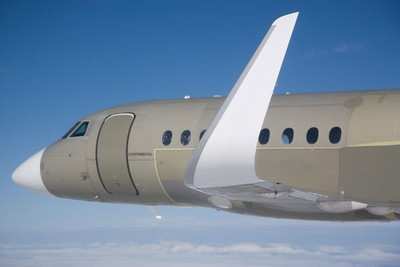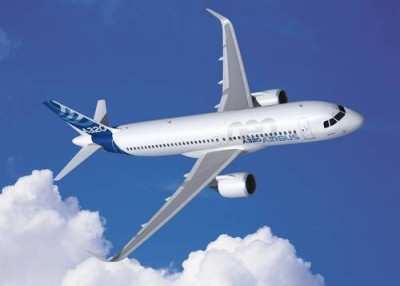Two Locked In A Legal Struggle Over Blended Winglet Design
When Joe Clark and his business associates founded Aviation
Partners, Inc. (API) in 1991, he had no idea that he'd be
locked in a legal battle with European government-backed aviation
giant Airbus.
API Blended Winglet

Now Aviation Partners has filed a response to the pre-emptive
lawsuit Airbus recently filed that seeks to invalidate Aviation
Partners' patent (number 5,348,253). This patent was issued in 1994
on the innovative Blended Winglet technology that is the foundation
of the small Seattle-based business. API Blended Winglets are in
service on more than 5,000 aircraft around the world and, because
of their improved aerodynamic efficiency, have saved more than 3
billion gallons of jet fuel, according to the company.
Aviation Partners began discussions with Airbus in 2006
regarding the use of its blended winglets on Airbus A320 series
aircraft. Through a series of negotiations, the parties entered
into a memorandum of understanding in July 2011. The intent of this
agreement was to form a joint venture to use Aviation Partners'
blended winglets on Airbus A320 aircraft.
In the meantime, Airbus, without notifying Aviation Partners,
sought a patent in Europe for its own "Sharklet" wing-tip.
Computer Rendering Airbus Sharklet

According to the court documents filed by API, the company
tested its blended winglet design on an Airbus aircraft in 2009,
but the two parties could not agree if the modification achieved
the required benchmarks required by Airbus to move forward. To
address that disagreement, about a year later, API at its own
expense performed additional flight tests using a JetBlue A320
aircraft. API says in its filing that the test flights took place
near San Bernardino, California. The flight tests were conducted in
good weather conditions, over water. Pilots, and others very
familiar with the Airbus A320 performance parameters, from both
JetBlue and API conducted those flight tests. Id. API achieved drag
reduction far in excess of the minimum benchmark during those tests
– and far in excess of the recently announced efficiencies of
the “Sharklet.”
Upon completion of the flight test, Airbus acknowledged that the
API blended winglets performed at a superior level.
Later in the summer of 2011, Airbus "provided API with data and
information (including engineering specifications and drawings) for
Airbus's 'Sharklet design,'" Joe Clark indicated in a sworn
declaration accompanying API's response. "API's engineers analyzed
the Airbus materials and noticed the striking similarity between
API's Blended Winglet… and the Airbus 'Sharklet'
design."
In its response, Aviation Partners has requested that the Airbus
lawsuit be dismissed or transferred to Seattle, Washington. In its
filing, API asks that "if the Court does not dismiss Airbus’s
insufficient complaint, API requests that, for the convenience of
the parties and in the interests of justice, the Court transfer
this matter to the United States District Court for the Western
District of Washington. The dispute has no connection to the
Western District of Texas. Neither Airbus nor API has facilities in
the Western District of Texas, no relevant evidence is located in
the Western District of Texas, and no potential witnesses reside in
the Western District of Texas. When it filed its Complaint, Airbus
knew that the Western District of Washington was the most
convenient forum. It also knew that the majority of witnesses
residing in the United States were located in the Western District
of Washington." In seeking the dismissal, API says that Airbus'
complaint is not supported by facts, and does not acknowledge the
years-long relationship between the two companies.
 ANN's Daily Aero-Linx (05.06.25)
ANN's Daily Aero-Linx (05.06.25) ANN's Daily Aero-Term (05.06.25): Ultrahigh Frequency (UHF)
ANN's Daily Aero-Term (05.06.25): Ultrahigh Frequency (UHF) ANN FAQ: Q&A 101
ANN FAQ: Q&A 101 Classic Aero-TV: Virtual Reality Painting--PPG Leverages Technology for Training
Classic Aero-TV: Virtual Reality Painting--PPG Leverages Technology for Training Airborne 05.02.25: Joby Crewed Milestone, Diamond Club, Canadian Pilot Insurance
Airborne 05.02.25: Joby Crewed Milestone, Diamond Club, Canadian Pilot Insurance




